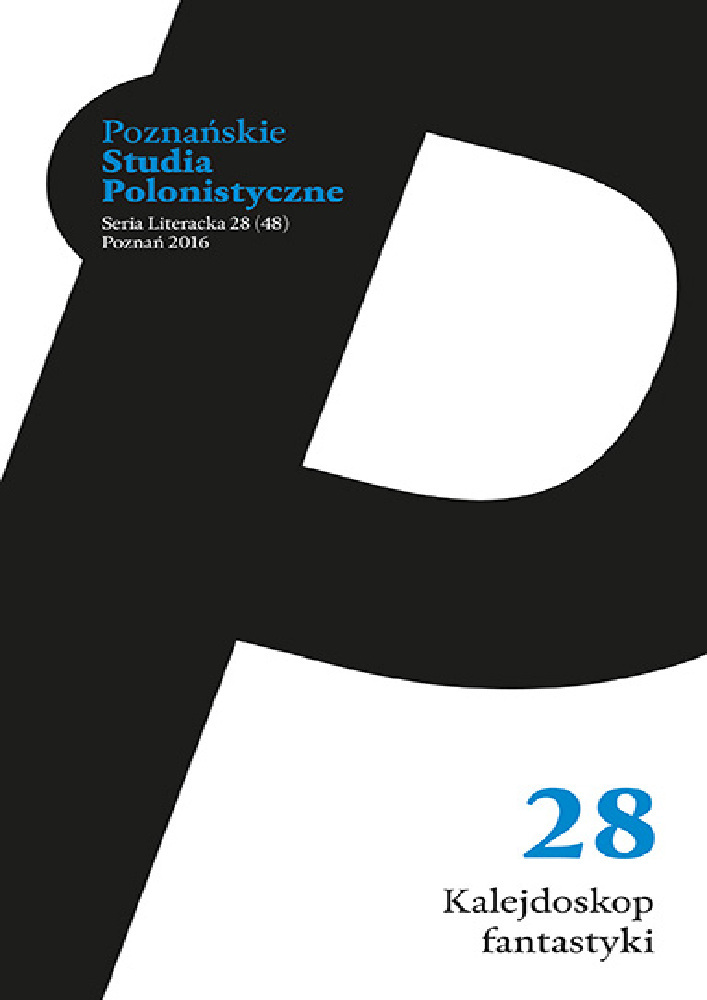Abstract
In the article the author examines fantastic novels by contemporary Polish writers (Andrzej Maleszka, Paweł Beręsowicz, Rafał Kosik and other) for young readers in a cultural context. In his essay he uses two well-known cultural categories “myth” and “magic” to his analysis of fantastic novels. According to the author, the myth and magic have two important functions in fantastic children’s literature. First, they lead young readers to knowledge about the world and depict different, complex phenomena of cultural dimension. Second, the myth and magic create a particular space (what “engulfs” young readers) of play and entertainment. Moreover, the myth and magic attract young readers to fabulous worlds including the elements of realistic literary convention. Thereby the writers increase their credibility among the youth. A “myth-magic” in the presented word of contemporary Polish fantastic novels assures balance between incredible entertainment represented by wizards, witches, dragons and the real world with characters having various digital devices within reach.References
Barthes Roland (2009), Mitologie, wstęp Krzysztof Kłosiński, przeł. Adam Dziadek, Aletheia, Warszawa.
Bartmiński Jerzy (2007), Językowe podstawy obrazu świata, Wydawnictwo UMCS, wyd. 2, Lublin.
Boni Michał, red. (2011), Młodzi 2011, Kancelaria Prezesa Rady Ministrów, Warszawa.
Brzostek Dariusz (2005), Problemy motywacji fantastycznej i fantastycznonaukowej, w: Polska literatura fantastyczna. Interpretacje, red. Andrzej Stoff, Dariusz Brzostek, Wydawnictwo Naukowe UMK, Toruń, s. 15-54.
Caillois Roger (2005), W sercu fantastyki, przeł. Maryna Ochab, Słowo/Obraz Terytoria, Gdańsk.
Czapliński Przemysław (2012), No future, w: Fantastyka w obliczu przemian, red. Rafał Kochanowicz, Dorota Mrozek, Beata Stefaniak, Wydawnictwo PTPN, Poznań.
Flowers Betty Sue, oprac. (2007), Potęga mitu. Rozmowy Billa Moyersa z Josephem Campbellem, przeł. Ireneusz Kania, Znak, Kraków.
Giddens Anthony (2010), Nowoczesność i tożsamość. „Ja” i społeczeństwo w epoce późnej nowoczesności, przeł. Alina Szulżycka, PWN, Warszawa.
Grochowski Piotr (2005), Mit w perspektywie badań literatury ustnej, w: Folklor w badaniach współczesnych, red. Adrian Mianecki, Agnieszka Osińska, Luiza Podziewska, Wydawnictwo UMK, Toruń, s. 17-25.
Kaja Damian (2012), Dziedzictwo lirnika. Orfeusz w tekstach kultury popularnej, w: Związki i rozwiązki. Relacje kultury i literatury popularnej ze starymi i nowymi mediami, red. Anna Gemra, Halina Kubicka, Wydawnictwo Uniwersytetu Wrocławskiego, Wrocław, s. 319-337.
Kołakowski Leszek (1994), Obecność mitu, Wydawnictwo Dolnośląskie, Wrocław.
Kosik Rafał (2008), Felix, Net i Nika oraz orbitalny spisek, Powergraph, Warszawa.
Krzysztofek Kazimierz (2010), Paratekst jako postfabrykat kultury, w: Pogranicza audiowizualności. Parateksty kina, telewizji i nowych mediów, red. Andrzej Gwóźdź, Universitas, Kraków, s. 13-34.
Kuligowski Waldemar (2007), Antropologia współczesności. Wiele światów, jedno miejsce, Universitas, Kraków.
Lem Stanisław (1954), Topolny i Czwartek, w: tegoż, Sezam, Iskry Warszawa, s. 5-45.
Maleszka Andrzej (2013), Magiczne drzewo. Gra, Znak, Kraków.
Mazurkiewicz Adam (2014), Z problematyki cyberpunku. Literatura – sztuka – kultura, Wydawnictwo Uniwersytetu Łódzkiego, Łódź.
Mróz Lech (1976), Mit i myślenie mityczne, „Etnografia Polska”, z. 1.
Szwagrzyk Aleksandra (2015), Stare (vs.) nowe: literatura dla młodych odbiorców a dyskurs nowych mediów, w: Sztuka dziecięca i młodzieżowa a nowe media, red. Maciej Wróblewski, Elżbieta Kruszyńska, Aleksandra Szwagrzyk, Wydawnictwo Naukowe UMK, Toruń, s. 31-37.
Urban Greg (2001), Metaculture: How Culture Moves through the World, University of Minnesota Press, Minneapolis–London.
Wróblewski Maciej (2009), „Czytanie przyszłości”. Polska fantastyka naukowa dla młodego odbiorcy, Wydawnictwo Naukowe UMK, Toruń.
Wróblewski Maciej (2011), Cyborgizacja codzienności człowieka. Stan współczesny i kilka myśli futurologicznych, „Litteraria Copernicana” 2011, nr 2, s. 8-19.
License
Authors
Authors of texts accepted for publication in „Poznańskie Studia Polonistyczne. Seria Literacka” are required to complete, sign and return to the editor's office the Agreement for granting a royalty-free license to works with a commitment to grant a CC sub-license.
Under the agreement, the authors of texts published in „Poznańskie Studia Polonistyczne. Seria Literacka” grant the Adam Mickiewicz University in Poznań a non-exclusive, royalty-free license and authorize the use of Attribution-NoDerivatives 4.0 International (CC BY-ND 4.0)Creative Commons sub-license.
The authors retain the right to continue the free disposal of the work.
Users
Interested Internet users are entitled to use works published in „Poznańskie Studia Polonistyczne. Seria Literacka” since 2016, for non-commercial purposes only, under the following conditions:
- attribution - obligation to provide, together with the distributed work, information about the authorship, title, source (link to the original work, DOI) and the license itself.
- no derivatives - the work must be preserved in its original form, without the author's consent it is not possible to distribute the modified work, such as translations, publications, etc.
Copyrights are reserved for all texts published before 2016.
Miscellaneous
Adam Mickiewicz University in Poznań retains the right to magazines as a whole (layout, graphic form, title, cover design, logo etc.).
